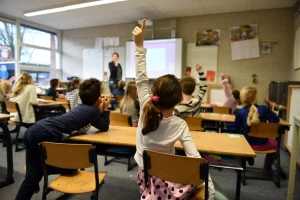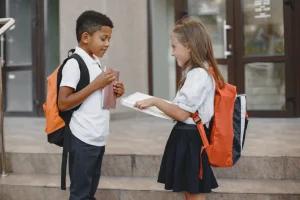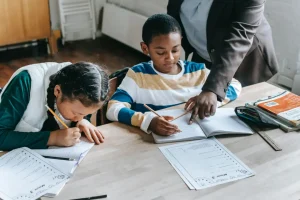The Welsh Government Legislation Keeping Learners Safe, lays out the safeguarding and child protection laws that must be followed by all schools, colleges, governing bodies and local authorities in Wales. This blog breaks down sections 3 and 4 of the legislation.
This blog is part 2 of a 3-part series about the Guidance Keeping learners Safe. Read Part 1 HERE and Part 3 HERE.
Keeping Learners Safe Guidance
The guidance sets out things that schools and colleges:
- Must do because it’s the law; and,
- Should do because it’s part of this guidance.
The summary of the guidance divides into eight sections:
- About Safeguarding in Wales
- Safeguarding Roles and Responsibilities
- Responding to Concerns
- Safeguarding in specific circumstances
- Domestic abuse, gender-based violence, sexual violence and harmful cultural practices
- Keeping Children Safe Online
- Community Cohesion
- Safer Staff Recruitment Practice
This blog discusses sections 3 and 4 of the guidance.

Responding to Concerns
It is vital that within an organisation everyone is working together to safeguard learners and respond to concerns in the right way. All schools and colleges should:
- Work with local authorities, the police, health services and other services
- Have clear steps for making referrals and sharing information
- Make referrals quickly so children and families get the support they need when they need it.
The Designated Safeguarding person (DSP) should:
- Help staff with their safeguarding questions and concerns
- Work closely with other services
- Ensure everyone is aware of the Wales Safeguarding Procedures
Information
The induction process for staff should include all safeguarding policies and procedures. During the induction all staff should:
- Have information about their DSP and how to contact them
- Be aware of the signs of abuse, neglect and other kinds of harm
- Speak to the DSP if they have concerns
- Know they can contact the local authority children’s social services team if they need to
- Always act in the best interests of the child
The Right Response to Safeguarding Concerns
All concerns about a learner must be shared with the DSP and if they reach the harm threshold then the report is shared with the relevant services.
All information and reports must be:
- Accurate, concise and clear
- Are kept confidential and only shared in the right ways.

Getting Advice
Every education establishment must have a suitable system in place for the reporting, recording and management of safeguarding concerns. Staff should go to the DSP if they have any safeguarding questions or need advice.
Investigations
Investigations into concerns about staff members must be reported to the local authority or the police.
Listening to the Child
Schools and colleges should endeavor to have safe spaces available for learners to talk about things that affect them Staff should:
- Encourage children to speak about concerns
- Share clear information about helplines and peer support options
Children may not always talk to a DSP about their problems and issues; instead, they may talk to a member of staff. If this happens the staff member must:
- Write a full record of the conversation as soon as possible including the time, full date, place, the circumstance of the meeting, who was present
- Be clear about facts, observations, allegations and opinions
- Note any action taken or comments/advice given
- Sign, time, and date the report
- Contact the DSP immediately

Involving Parents or Carers
Parents and carers should understand the duty that schools and colleges have to safeguard learners. The child’s safety must come first; therefore, if appropriate, discuss any concerns with the family, if it is not safe, contact the DSP who will work with other services and the police to decide what happens next.
Additional Learning Needs
All schools and colleges should:
- Understand that children with additional learning needs may be at increased risk of abuse, neglect and harm
- Understand the barriers they may face, especially around communication
- Provide any additional support needed to protect them
Culture and Beliefs
All schools and colleges should:
- Get to know the culture and beliefs of families in their community
- Deal with sensitive issues like female genital mutilation (FGM) and forced marriage

Past experiences
Staff should be aware that previous experiences of abuse and neglect can make children more vulnerable.
Immediate concerns
Schools and colleges must tell the local authority if they believe a child is at serious risk. Likewise, if there are immediate concerns about a child’s safety, the police must be contacted straight away.
Reporting concerns to social services or the police
The DSP must decide whether to report a concern to social services and/or the police. The report must:
- Be in written form
- Have all the basic information including cause for concern
- Be sent within 24 hours
If a report is made in person or by telephone, it must be confirmed in writing within 24 hours. Outside of office hours, reports must be made to the social services emergency duty service or to the police. The DSP should:
- Share the report with the staff member involved and the head teacher or principal
- Explain what is happening, why a report has been filed, and who is taking action

Information-sharing
It is important that information is shared correctly to ensure the best outcomes. It is the duty of the DSP to make decisions about what information to share with which service.
Duty of confidentiality
There are times, when it’s in the best interest of a child, that confidential information needs to be shared. If this needs to happen the school or college should:
- Support the child
- Tell the child, unless it puts them at further risk
- Make sure any decision is recorded
Record-keeping
The DSP must:
- Keep detailed and accurate written records of safeguarding concerns in a secure place
- Keep records confidential and separate from other learner records
- Send a copy to a child’s new school or college when they move
- Know how long records should be kept once the child has left your environment
The full summary of Keeping Learners Safe is available here.
Read parts 1 and 3 of the blog series.
How Can Training in Safeguarding Help you in your Role
If you work with children and young people, you are responsible for keeping those in your care safe from harm. Our safeguarding course on our Equal Academy covers types of abuse, reporting a concern, and how best to deal with disclosures from learners.
This course has been developed by two of Equal’s team members. One who was an ex primary school headteachers with many years experience as a Designed Safeguarding Person, and the other who is Equal’s Designed Safeguarding Person and is a practicing secondary school teacher in Wales.
Our safeguarding course is completely free of charge for all Equal staff members!




